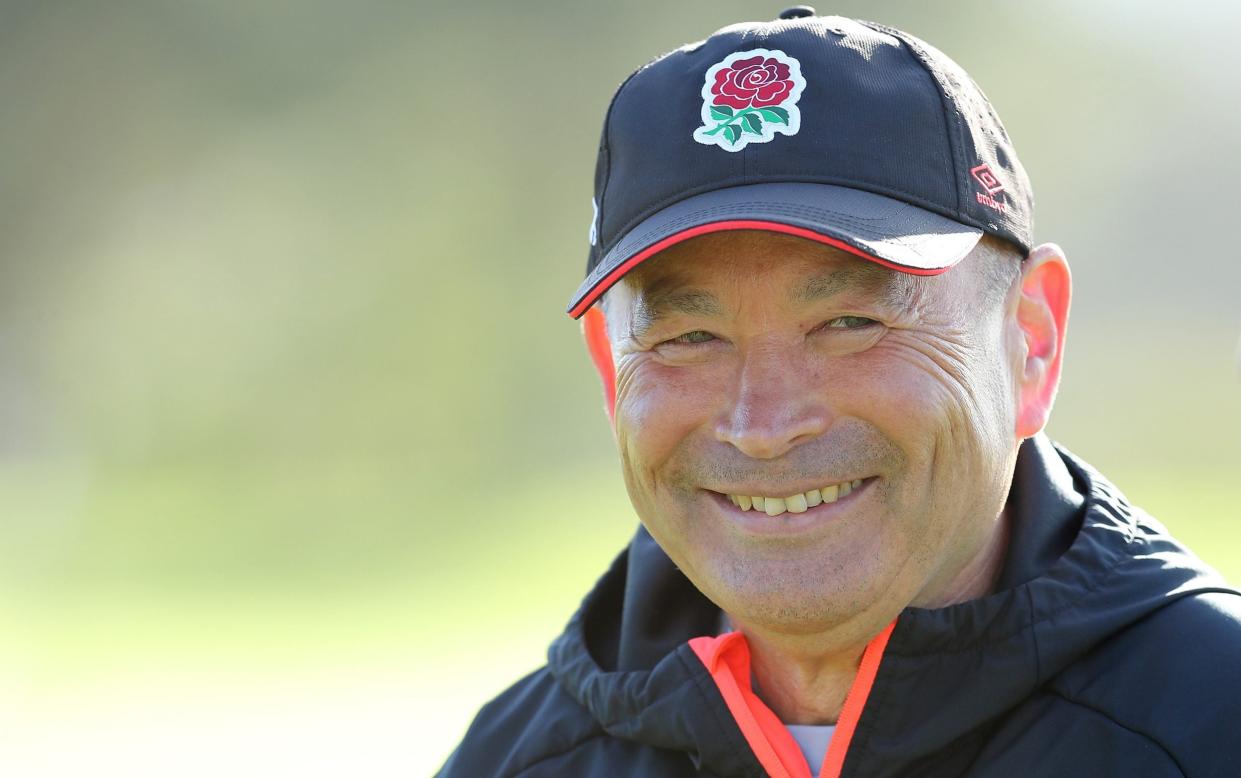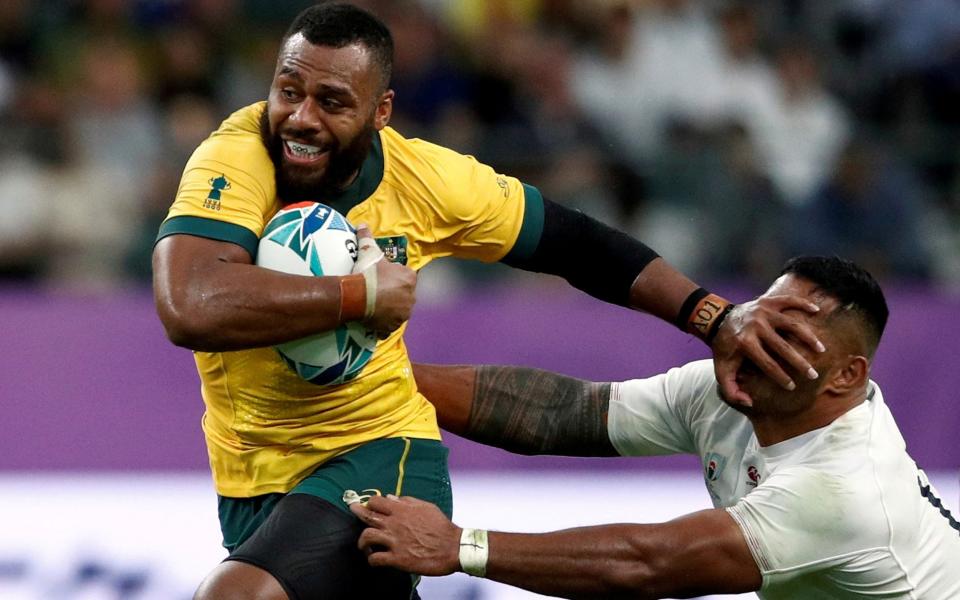Six ways England can beat the Wallabies

After a disappointing run of form, Eddie Jones will be desperate for England to click into gear ahead of next year's World Cup. But his much-changed side face a tough task against Dave Rennie's improving Wallabies. Telegraph Sport assesses six key areas that will define the first Test in Perth on Saturday.
Match hosts' mauling muscle
For a team handing out two debuts in the tight five, Australia have been self-assured about their mauling prowess. Speaking earlier this week, Dave Rennie said he was eager to “overshadow” the tourists in that area.
Dave Porecki and Cadeyrn Neville, at hooker and lock, are the two Wallabies rookies. Aged 29 and 33, respectively, they are hardly inexperienced.
Neville can lean on existing synergy, too. He is one of four Brumbies in the starting pack. Four more of the franchise’s forwards are among the replacements. Dan McKellar, who was Brumbies head coach for their run to this year’s Super Rugby semi-final, has joined Rennie’s set-up as well.
Brumbies racked up the most mauls (98) and scored the most maul tries (11) over the course of the Super Rugby campaign. Maro Itoje, an arch disruptor, will be charged with swimming through bodies to stall any drives.
Stop Kerevi
The relationship between Samu Kerevi and Eddie Jones has earned plenty of column inches over the past year, mostly due to their shared association with Suntory Sungoliath in Japan.
In his autobiography, Jones labelled Kerevi as “an immensely attacking force” and admitted that he traditionally felt more comfortable selecting Owen Farrell at fly-half alongside two specialist centres – Manu Tuilagi and Henry Slade, for instance – to quell that direct threat.
Since the beginning of 2019, Australia have averaged 501 running metres per match when Kerevi plays. When he does not, that figure drops to 426.
But Jones has opted against slipping Farrell back to 10. Instead, he has retained Marcus Smith for an 11th consecutive start at fly-half. As well as suggesting that England will move the ball, that is a compliment to Smith’s improving defence.
England will have to be sturdy and mobile without possession and must attack the breakdown where referee James Doleman allows.
As highlighted by statistician Russ Petty, Rennie has assembled the same backline that beat South Africa 30-17 last year. Featuring Len Ikitau, Marika Koroibete and Andrew Kellaway, it is brimming with athleticism.

Seize the scrum
Taniela Tupou could return for the second Test, but his absence in the series opener represents a significant blow to Australia. Not only do they lose a rampaging carrier, they have also asked James Slipper to cover tighthead prop from the bench.
Slipper has 114 caps and did a decent job on the other side of the front row in the last meeting between England and the Wallabies. That was opposite Bevan Rodd, though.
England have deployed Ellis Genge and Mako Vunipola as their one-two punch at loosehead prop for this game. Luke Cowan-Dickie is backing up Jamie George at hooker. That makes three British and Irish Lions plus the Leicester captain. Joe Heyes, Will Stuart’s understudy, has played 101 senior matches for Tigers at the age of 23.
Resisting any temptation to play Courtney Lawes as a lock, Jones has teamed up Jonny Hill with Itoje. That makes for a hefty unit. Matt Proudfoot and Richard Cockerill, charged with England’s set-piece operation, could do with making a statement.
Revive 'Bodyline' by using Cokanasiga
Six years ago, England were indebted to a monumental series from Billy Vunipola as they rope-a-doped their way to a 3-0 whitewash. Manu Tuilagi was injured then, too. George Ford, Farrell and Jonathan Joseph comprised the midfield for the most part.
Vunipola can expect a big carrying load in this second coming. Genge should be a willing accomplice, but Joe Cokanasiga might be a game-breaker. The wing’s record for England matches stands at 11 tries in 11 Tests and there is little doubt that there is untapped potential.
WOW @J_cokanasiga 😱😱
Watch live on @SkySport Main Event. #ENGvIRE #CarryThemHome pic.twitter.com/2CaLfeM4o5— England Rugby (@EnglandRugby) August 24, 2019
Although his performance against the Barbarians a fortnight ago was far from perfect, he picked up 17 attacking touches – more than he has ever registered in a Test match.
Do not forget that England managed just eight tries in the Six Nations, with five of them scored in Rome. Their points per entry to the opposition 22 languished at 1.6. Only Italy were less effective. Cokanasiga popping up around the field will only enhance an ailing attack.
Rule the kicking exchanges
One tactical shift that Rennie has overseen has been a greater appreciation of territory. At the 2019 World Cup, which proved to be Michael Cheika’s final tournament in charge of the Wallabies, they averaged just over 13 kicks per match. In both 2020 and 2021, that mark surpassed 19.
Jones expects Australia to keep those kicks in-field to deny England a line-out platform. Across their eight wins over the Wallabies since the start of 2016, England have averaged 10.4 line-out throws per match. For context, they have averaged nine against Wales, who are known to kick down the middle to encourage long, unbroken passages of play.
Nic White, another Brumbies lynchpin, will use his boot a great deal. In response, England will team up Billy Vunipola and Freddie Steward in the back-field. As well as organising phase-play, Smith and Farrell will look to pull the Wallabies around the field. Watch out for the chips and clips of Danny Care as well.
Play the officials
A promising 2021 ended in a whimper for Australia as they lost all three matches on their European tour. Key players were missing, yet horrific discipline proved decisive.
In all, the Wallabies conceded a debilitating tally of 45 penalties across three matches. They copped one yellow card against Scotland, two against England and a yellow and a red against Wales. Australia spent 86 of 240 minutes down to 14 players and 10 more with 13. They scrapped with one hand tied behind their back.
James Doleman, a New Zealander, oversees the first Test with Andrew Brace and Paul Williams, two more experienced officials, refereeing the second and third. Australia will be more familiar with Doleman, who took charge of their first game of their series against France last July.
Tackle-height, the ruck area and scrummaging angles are sure to be under particularly close scrutiny. It will be interesting to see whether England turn to Jack Willis and Luke Cowan-Dickie for the second Test. Brace is known to reward the defending side at the breakdown and those two are prolific jackallers.
Before that, the spotlight falls on Doleman. Another subplot will be how the captains, Courtney Lawes and Michael Hooper, interact with a rather green referee.
The latter has been rather abrasive in conversations with officials over the years. England will be glad if that manner resurfaces, because it will probably mean that Australia are leaking penalties again.

 Yahoo Movies
Yahoo Movies 
